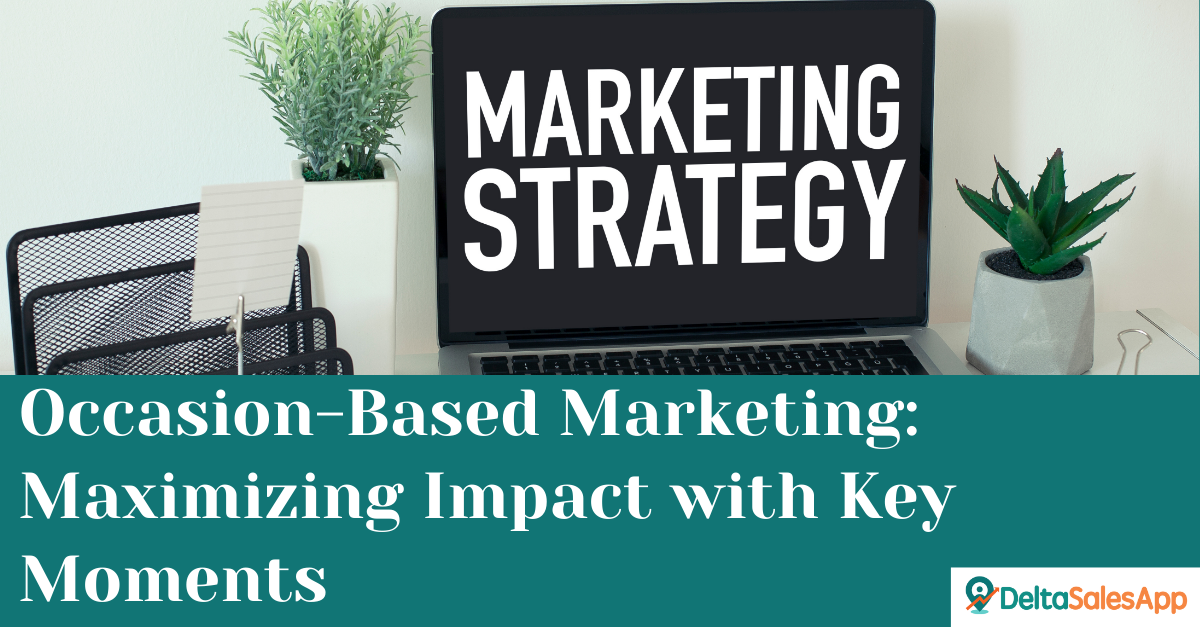Occasion-Based Marketing: Maximizing Impact With Key Moments

Table Of Content
Occasion-Based marketing (OBM) is a highly effective strategy that taps into the emotional and situational triggers of consumers. Whether it’s celebrating a traditional festival or taking a quick break during a busy day, consumers' purchasing decisions are often driven by specific occasions.
In this blog, we’ll explore how occasion-based marketing works, share some successful examples, and guide you on how to implement it for your business.
What is occasion-based marketing?
Occasion-based marketing refers to the tactic of aligning marketing campaigns with specific events or moments in a consumer’s life. These events can be seasonal celebrations, festivals, personal milestones, or even small moments like enjoying a snack during a break. By targeting the right occasion, brands can create a deep connection with consumers, enhancing the relevance of their offerings.
The key to effective occasion-based marketing is identifying when your target audience is most likely to engage with your product and tailoring your campaigns accordingly. This could involve offering relevant discounts, time-limited deals, or showcasing how your product fits seamlessly into those special moments.

Successful Examples of Occasion-Based Marketing
Cadbury’s "Sweet Moments" Campaign
One of the most successful examples of occasion-based marketing is Cadbury’s campaign targeting India’s sweet tooth. In India, it’s a cultural tradition to offer sweets during festivals or special occasions like weddings and family gatherings. Cadbury seized this opportunity by positioning its products as the go-to gift for such moments. By aligning their campaign with the tradition of giving sweets, Cadbury was able to significantly expand its reach. Their message resonated well with both children and adults, helping the brand solidify its place in the Indian market.
KitKat’s “Have a Break, Have a KitKat”
KitKat’s famous tagline, "Have a Break, Have a KitKat," is a perfect example of occasion-based marketing. The brand cleverly tapped into the daily routine of busy individuals who take short breaks throughout the day. Instead of positioning the product as a mere snack, KitKat was marketed as a way to enhance these short moments of relaxation. Whether at work or at home, a quick KitKat break became the go-to ritual, reinforcing the idea of enjoying a snack during stressful or busy times.
Coca-Cola’s “Thanda Matlab Coca-Cola” Campaign
Another iconic occasion-based marketing campaign is Coca-Cola’s “Thanda Matlab Coca-Cola” in India. The phrase directly translates to "Cold means Coca-Cola." By associating Coca-Cola with the need for something cold and refreshing, Coca-Cola effectively tied the product to situations when people would want to quench their thirst, particularly during the hot Indian summers. The campaign created an instant connection with consumers, making Coca-Cola the go-to drink during any occasion when people needed something cold.
How to Implement Occasion-Based Marketing for Your Business
To make occasion-based marketing successful for your brand, you need to first identify and understand the occasions that matter most to your target audience. Here’s how you can get started:
Identify Key Occasions
Start by analyzing the moments that drive your audience’s purchasing behavior. These can include national holidays, festivals, birthdays, or specific seasonal events. For instance, if you sell food items, you may find that certain occasions like New Year’s, Diwali, or Eid prompt higher food sales. Make sure to research your market and understand when your consumers are most likely to need or want your product.
Tailor Your Marketing Message
Once you’ve identified the relevant occasions, craft your marketing message accordingly. The key here is to create a sense of urgency or excitement around the moment. Make sure the message aligns with the occasion—whether it's a celebratory tone, a reminder of a tradition, or a fun way to break from routine. Use language that resonates with the emotions tied to the occasion.
Leverage Promotions and Discounts
Occasions are the perfect time to offer special promotions. Consider offering limited-time discounts, bundle deals, or free gifts tied to a particular occasion. For example, a brand selling gift items could offer a “Buy 1, Get 1 Free” deal during festive seasons. This tactic not only drives sales but also encourages people to purchase more than they normally would.
Create Timely Content
To capture attention, create content that speaks directly to the occasion. For instance, social media posts, advertisements, or email newsletters that highlight the upcoming event and show how your product fits into it will grab consumer attention. Use engaging visuals, catchy phrases, and relatable scenarios that connect your brand with the moment.
Track and Analyze Your Campaigns
It’s essential to track the success of your occasion-based campaigns. Use analytics to see how well your promotions perform, what type of content resonates with your audience, and whether you achieve the desired outcome. Regularly assess and refine your strategies based on this data for even better results next time.
Conclusion
Occasion-based marketing is a powerful tool for driving engagement, creating lasting consumer relationships, and boosting sales. By understanding and leveraging key moments in your target audience’s life, you can make your products more relevant, timely, and valuable. Whether it’s a traditional festival or a simple afternoon break, aligning your marketing campaigns with these moments can create a deeper connection with your customers and significantly improve your brand's success.
Take a lesson from brands like Cadbury, KitKat, and Coca-Cola—capitalize on the moments that matter most, and you’ll soon see the positive impact on your sales.
Message on Whatsapp
You can get in touch with us using Whatsapp. Send us a message and we'll get back to you a soon as possible
_(1)_(5)_1743768892-resized320.png)


